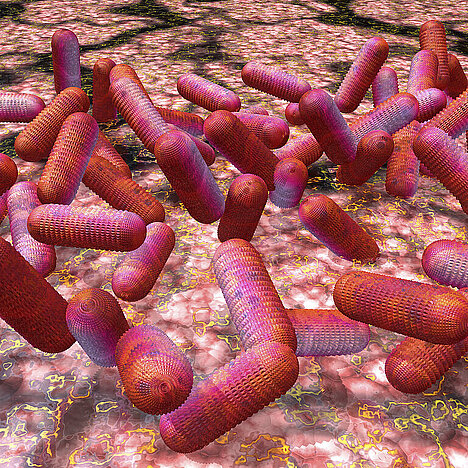E. coli

Escherichia coli, or E. coli for short, are bacteria found in the intestines of dogs and other mammals. Normally they are harmless and are part of a healthy intestinal flora. But sometimes they can lead to a disease called colibacillosis or E. coli infection. This can cause serious symptoms and complications in dogs, especially puppies. In this blog post, you'll learn how to recognize, treat and prevent E. coli in dogs.
What are the causes of E. coli in dogs?
The most common cause of E. coli infection in dogs is contact with infected bitches or puppies. If a pregnant or lactating bitch has E. coli in her intestines, she can pass the bacteria on to her puppies through her mother's milk or during birth. The puppies still have a weak immune system and can easily become infected. Contact with infected feces, food or water can also lead to infection.
Not all E. coli strains are equally dangerous. There are so-called pathovars, which have certain characteristics that make them pathogenic. For example, they can produce toxins that damage the intestinal mucosa or enter the bloodstream and attack organs. These pathovars can also occur in healthy dogs, but usually without causing symptoms.
How do I recognize an E. coli infection in dogs?
An E. coli infection in dogs can manifest itself in different ways, depending on the age, health status and affected organ of the dog. The most common symptoms are
- Diarrhea
- vomiting
- Loss of appetite
- dehydration
- depression
- Weakness or lethargy
- Rapid heart rate
- Cold skin or low body temperature
- Bluish color in gums, nostrils, ears, lips or anus due to lack of oxygen supply to red blood cells
In newborn puppies, an E. coli infection can very quickly lead to blood poisoning (sepsis) and organ failure, which is life-threatening. In older dogs, other infections such as bladder, mammary gland, uterine or kidney infections can occur.
If you notice one or more of these symptoms in your dog, you should see a vet immediately. They can make a diagnosis by examining a fecal sample or a blood sample and determine if E. coli is present and what type of pathovar it is.
How is an E. coli infection in dogs treated?
The treatment of an E. coli infection in dogs depends on the severity of the symptoms and the organ affected. In most cases, the vet will prescribe antibiotics to combat the bacteria. They must ensure that they select a suitable antibiotic that is effective against the specific strain of E. coli. This is because some E. coli strains are resistant to certain antibiotics and can render them ineffective.
In addition to antibiotics, the dog must also be given supportive treatment to stabilize its vital functions and ensure its fluid and electrolyte supply. To do this, it may be necessary to give the dog intravenous fluids or medication to stop vomiting or relieve pain.
The duration of treatment depends on the dog's recovery, but can take several weeks. During this time, the dog must be examined regularly by the vet to check whether the infection has cleared up and whether there have been any side effects or complications.
How can I prevent an E. coli infection in dogs?
The best prevention against an E. coli infection in dogs is good hygiene and a healthy diet. This includes the following measures:
- Keep the area where your dog lives clean and regularly disinfect his sleeping, eating and drinking areas.
- Wash your hands before you touch or feed your dog and after you have disposed of its droppings.
- Feed your dog high-quality food that is free from contamination and always provide him with fresh water.
- Avoid feeding your dog raw meat or other foods that may contain E. coli.
- Have your dog regularly examined and vaccinated by a vet to boost his immune system and rule out other diseases.
- Keep your dog away from other infected dogs and quarantine him if he is infected himself.
- Have your bitch tested for E. coli before pregnancy and ensure a hygienic birthing environment and an adequate milk supply for the puppies.
With these tips you can reduce the risk of an E. coli infection in your dog and give him a healthy and happy life.
The authors assume that a veterinarian should be consulted if an animal is ill and that medication should only be taken after consultation with a doctor or pharmacist. Only an individual examination can lead to a diagnosis and treatment decision.
We help you find the nearest vet → This way